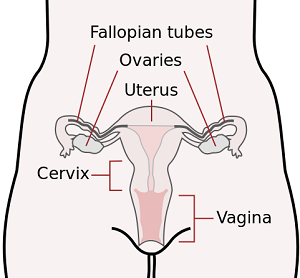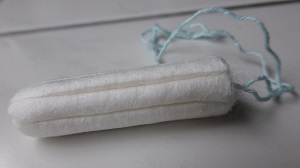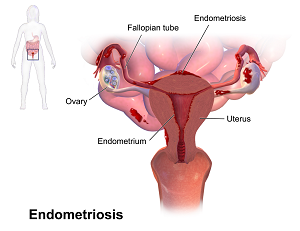Sex is a favorite activity, not only for men, but for women as well. Women often discuss it over the phone, or talk about it over cocktails. However, despite being open about sex, many women still remain hush-hush over painful intercourse.
 Dyspareunia is the medical term for a condition in which women experience recurring pain in the vagina or the surrounding area during sexual intercourse.The cause of dyspareunia can either be physical, psychological or both.
Dyspareunia is the medical term for a condition in which women experience recurring pain in the vagina or the surrounding area during sexual intercourse.The cause of dyspareunia can either be physical, psychological or both.
A recent study suggests that cases of dyspareunia are high, but many cases remain unreported. Many women are embarrassed to open up about their sexual problems, while some just shrug it off. If dyspareunia is left unchecked and untreated, it can lead to negative expectations about sex and the avoidance of intercourse. These, in turn, will impact your relationship with your partner.
Know The Symptoms Of Dyspareunia
The common symptoms of dyspareunia are:
 Severe pain upon penile penetration
Severe pain upon penile penetration- Excruciating pain during thrusting
- Burning pain in the genitals during intercourse that may last for hours
- Throbbing or constricting pain after completing the sexual act
- Pain when inserting a tampon in the vagina
If you are experiencing any of these symptoms, consult a medical professional. An accurate diagnosis will lead to a proper treatment and in reviving your sex life.
The Causes Of Dyspareunia
Dyspareunia, or pain during intercourse maybe caused by the following factors:
- Inadequate Lubrication: Vaginal dryness can lead to painful intercourse since the lubricating fluid makes it smooth and easy for the penis to penetrate and thrust. There is insufficient lubrication once your vaginal walls start to thin due to poor blood flow, resulting from low estrogen during menopause, after giving birth and when breastfeeding. A lack of stimulation and arousal before engaging in intercourse also makes it painful for
- Trauma: Invasive procedures done in the pelvic region and the genital area can cause pain. Pelvic surgery,an incision on the vagina during child delivery and female circumcision can leave trauma,which may lead to dyspareunia. Before engaging in intercourse, make sure the incisions have fully healed to avoid further trauma, slow healing, and pain. If you have undergone a hysterectomy, you are likely to experience dyspareunia, too. Unfortunately, treatments of hysterectomy, such as radiation and chemotherapy can make the pain worse.
- Irritation:The pain could be an allergic reaction to strong substances in soap and douches.
- Athropic Vaginitis: A common condition in menopausal women that causes the thinning of the vaginal lining, making it extra sensitive to friction.
 Infections And Inflammation: Sexually transmitted diseases, yeast infections, urinary tract infections and vulvar vestibulitis can make intercourse painful.
Infections And Inflammation: Sexually transmitted diseases, yeast infections, urinary tract infections and vulvar vestibulitis can make intercourse painful.
- Vaginismus: A condition characterized by sudden, involuntary spasms of the vaginal muscles that can cause intense pain. Before resorting to this invasive procedure in treating vaginismus, ask for a second opinion. Vaginismus rarely requires surgery to treat it properly. The procedure might lead to scarring and trauma causing dyspareunia.
- Endometriosis: This is a condition where the tissue of the uterus lining grows outside. It can cause pelvic pain, cramps, and painful intercourse.
-

Photo by BruceBlaus / CC BY Congenital Problems: These are conditions present at birth. The vagina may not be fully developed, or a membrane is blocking the vagina’s entrance.
- Psychological Problems: Depression, anxiety and trauma from past sexual abuse may lead to a negative attitude and response towards sex.
What To Do To Minimize The Pain Of Dyspareunia
Depending on the underlying cause of dyspareunia, you can still enjoy sex by minimizing the pain:
1.  Engage In Foreplay.Is the pain due to lack of lubrication? Sometimes people rush into doing the actual deed that they skip or rush foreplay.
Engage In Foreplay.Is the pain due to lack of lubrication? Sometimes people rush into doing the actual deed that they skip or rush foreplay.
Take the time to arouse each other. Long slow stimulation during foreplay will trigger the vaginal walls to release sufficient lubrication.
If foreplay does not seem to help, you can use quality water-based lubricants. A lubricant like that offered by HerSolution not only provides enough fluid, but it can also enhance sensations. Check out their website https://www.hersolution.com/.
2. Switch To Mild Products.If the pain is an allergic reaction to strong substances, switch to milder ones. Mild hygiene products are usually unscented with a short ingredient list. Douches contain irritants and condoms can also cause irritation. Before buying a pack of rubber, read labels first. Make sure it does not contain allergens.

3. Counseling.In some cases, the cause of dyspareunia is psychological issue, such as depression, anxiety and trauma from past sexual abuse. You can seek help from a counselor to help you deal with your emotional issues, and a sex therapist to help you achieve a positive attitude towards sex.
4. Avoid Deep Penetration.If you have endometriosis, tell your partner not to thrust too deep. Having sex after ovulation,which is two to three days after menstruation, may help lessen the pain.
5. Consult Your Doctor.To get the most effective treatment, your doctor needs to diagnose your condition and its underlying cause accurately. Do not jump to conclusions and self-medicate.
 During your consultation, your doctor may ask you the following questions:
During your consultation, your doctor may ask you the following questions:
- When did the pain start occurring?
- Did you have it since birth, or just recently?
- Are you suffering from any types of infection or STD?
- Were you sexually abused in the past?
- Did you suffer some sort of physical injury while having sex?
After diagnosing your issue, your doctor may recommend treatments, such as antibiotics for an infection, hormone replacement therapy for menopausal women experiencing vaginal dryness, steroid creams, oral medications or surgical procedures.
Dyspareunia resulting from physical conditions can easily be treated with the proper medical care. However, you can lower your risk to suffering from it by doing the following:
- Practice safe sex, especially with a new partner to prevent sexually transmitted diseases. Implement a no condom, no sex policy.
- Practice proper hygiene to avoid a yeast Avoid tight-fitting underwear. Change your clothes when you are wet with sweat. Do not let your clothes dry on your skin after swimming.
- To avoid urinary tract and bladder infections, wipe your genital area clean after using the toilet and urinate after sexual
- If you constantly suffer from the vaginal dryness, keep lubricants handy.
Though seldom talked about, you might be surprised to know that 60 percent of women suffer from painful intercourse. The good news is, there are plenty of things you can do to treat it.
